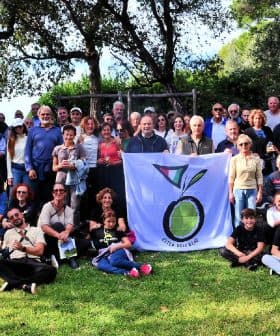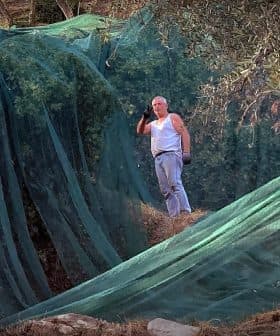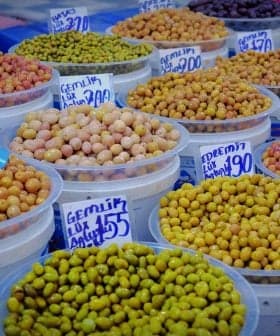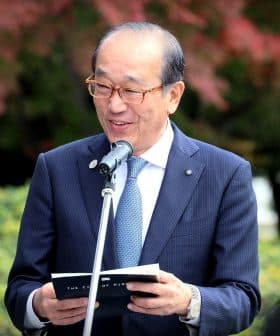Cengizhan Şimşek Claims Başpehlivan Title at 661st Kırkpınar
Twenty-six-year-old Cengizhan Şimşek defeated several former champions en route to his victory at the 661st edition of the world’s oldest sporting event.
 Cengizhan Şimşek
Cengizhan Şimşek Turkish wrestler Cengizhan Şimşek won the 661st Kırkpınar olive oil wrestling championship, defeating Mustafa Taş in overtime to claim the title of başpehlivan and the prestigious golden belt. The event, which attracted a record-high 2,475 wrestlers, saw Şimşek dedicate his victory to his parents and become one of the youngest-ever champions in the competition’s history.
Over the weekend, a sold-out crowd witnessed Turkish wrestler Cengizhan Şimşek claim his first-ever victory in the 661stKırkpınar olive oil wrestling championship, becoming one of the youngest-ever champions.
Şimşek defeated compatriot Mustafa Taş in overtime to claim the title of başpehlivan – chief wrestler – and the competition’s prestigious golden belt and prize money.
“My dream has come true,” Şimşek told local media. “When you work hard, God rewards your efforts.”
On his way to the final, the 26-year-old defeated some of the tournament favorites, including two-time champion Orhan Okul, 2017 champion İsmail Balaban, Menderes Saltık and Tanju Gemici. Taş faced a similarly challenging run to the final.
See Also:Turkish Producers Reach New Heights in World CompetitionLocal media reported that both wrestlers were greeted enthusiastically by the audience and responded by performing a traditional choreographed pre-match routine known as a peşrev.
Considered underdogs at the start of the competition, both wrestlers began the final round cautiously, and after 40 minutes, neither one was able to get the best of the other.
Once time expired, the match went into overtime, where each wrestler earned points for different technical moves. Finally, in the 59th minute, Şimşek caught Taş off-guard to win the match.
Şimşek dedicated the victory to his parents from the coastal city of Antalya, home to several other champions in the past decade.
“This year, our young wrestlers took Edirne by storm,” Recep Gürkan, the city’s mayor, wrote on Facebook. “I congratulate both of our wrestlers who have written their names in history with golden letters and wish them success.”
A record-high 2,475 wrestlers flocked to Edirne in northwestern Turkey to compete, where shirtless athletes wearing the traditional leather pants known as kıspet cover themselves in olive oil and grapple with their opponents on a grass field until one of them is knocked onto his back. Over three days, wrestlers fight in pairs until only one is left standing.
An estimated two tons of olive oil are used during the event. Wrestlers douse themselves in olive oil to make it more difficult for their opponents to get a firm grip on them. Some also claim that applying fresh oil between fights helps soothe their injuries.
This year’s event garnered particular interest from the Turkish public. Defending champion Ali Gürbüz was competing to win his third consecutive title, which would have made him an eternal holder of the golden belt. However, he fell short, losing to 2016 runner-up Mehmet Yeşil early on.
Organizers also lifted audience restrictions imposed to curb the spread of the Covid-19 pandemic, which was partially attributed to the uptick in attendance.
While many felt that this year’s edition of Kırkpınar would be a return to normality, the event featured plenty of drama.
Away from the multiple upsets caused by the two finalists, tempers flared early on when the referees eliminated the 2005 champion and 2018 and 2019 runner-up Şaban Yılmaz for foul play. The enraged former champion stormed into the referee box and had to be calmed down and removed by local police.
Kırkpınar is widely thought to be the world’s oldest sporting event and was recognized in 2010 on UNESCO’s list of Intangible Cultural Heritage of Humanity. Its origins date back to 1357 when a group of Ottoman soldiers stopped near present-day Edirne.
To pass the time, 40 soldiers decided to wrestle in pairs. After the rest had stopped, the last two wrestled into the night and were found dead the next morning.
There was no winner, but the event has been held annually since then, except in 2020 when Kırkpınar was canceled in response to the rapid spread of Covid-19 in Turkey.
“I heartily congratulate all our wrestlers who sweat in the hallowed field,” Gürkan said. “I hope to meet you all at the 662nd Kırkpınar in 2023 on the 100th anniversary of our republic.”
This is a breaking news article. Check back for updates.
Share this article









